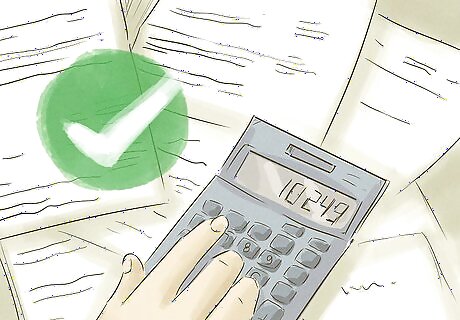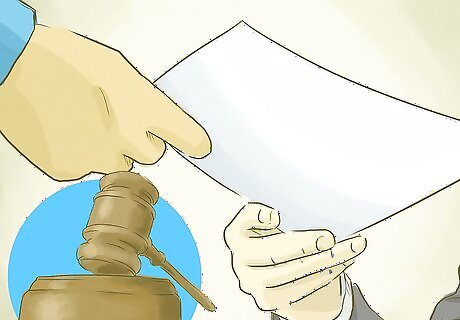
views
Evaluating Your Position

Identify the legal issue. This is the first question a lawyer would ask you. Some common legal issues facing pro se litigants are divorce, child custody and visitation, consumer protection, personal injury, and landlord-tenant. The first question is always, "What is the problem?" For criminal cases where your freedom is at risk, you are entitled to have legal counsel appointed to represent you. In civil contempt cases, such as child support, you may have the right to an attorney and should ask the court about your eligibility.

Identify the parties. The next step is to write down who the parties are. In a divorce, it is your spouse, but in a consumer issue (for example, your car is a lemon or a contractor didn't finish a job), the other party may be a business or corporation. If one of the identified parties is a business, you need to determine who you need to talk to and who can accept legal papers. In a small business, this will usually be the owner. A corporation will have a registered agent, or an agent of service of process. This information is available through your state's Secretary of State office or contact the company and ask for the name and address.

Quantify your damages. You will need to determine exactly how you were damaged and what the costs have been. Damages can include repair costs, rental costs, lost wages, and medical costs. Round up your receipts and bills. An example of a quantifiable damage is having to hire someone to fix cracks in your foundation caused by a contractor. If you had to take time off of work to deal with the problem, your lost wages may also be a quantified damage.

Define your goals. Now that you know the problem, what do you want to happen? Be realistic and as specific as possible. The key is to make your goals quantifiable and something a judge can grant. A judge can't fix your anger or force the other side to apologize. She can only order payment to correct the situation. In a domestic case, your goals may be to get more visitation with your children or to gain custody. In a civil case, your goal may be to get reimbursement of costs you incurred because of a company's negligence. For example, you may have had to rent a car because the mechanic damaged yours or hire another contractor to redo shoddy work.

Start a case journal. In a notebook, keep track of everything you know about your problem and every step you take to resolve it. When you are in court and the judge asks you a question about your actions, you don't want to depend on your memory. Note the date, time, and who you communicated with, every time you have contact with someone about your case. Also keep track of your costs as you try to resolve the issue, including postage, copying, mileage, and legal assistance. Keeping screenshots of emails with headers and text messages can help you back up the entries in your journal.
Using Alternatives to Court

Exhaust your out-of-court options. Before you take someone to court, you should attempt to settle the issue in writing. If you are dealing with a business, you should write a Demand Letter. Address it to the person who can solve your problem. This may be the head of a department, the owner, or the legal department. Send several letters if it is a large company and also send a copy to the registered agent of service. Be professional. The general formula is to identify yourself, identify the problem, make your claim, support your claim, close with a statement that the next step will be legal action, and include your contact information. You can be pointed, but not immature. Send your Demand Letter by certified mail and keep copies of the letter and the return receipt card. If you go to court, this is your proof that the other side was aware of the problem.

File a case in small claims court. If your legal matter is against another person or business and can be solved by a cash award, you may be able to go to small claims court. Generally, the maximum amount of your damages cannot be more than $10,000. Small claims court cannot make a business perform an action. For example, the judge can order the contractor to pay you to have someone else repair your foundation. However, she cannot make the contractor do the work. Generally you file your claim in the county where the defendant lives or has offices.This is called venue. The court clerk's office will have a fill in the blank application for small claims court. Refer to your demand letter for a summary of the case. The filing fee varies, but is usually under $100. Small claims court is less formal, but you will still be expected to be prepared and professional. Organize your documents and your case journal so you can tell your story to the court quickly and not miss any important details.

Engage a mediator. This is a good option for issues involving child custody and visitation and is encouraged, even required, by the court. Costs will vary with a range of $100 to $300 per hour depending on the region. Most mediation agreements will state that the costs will be split between the parties. A mediator is most common for family law cases, but can be used for any legal dispute. However, you have to be on moderate speaking terms with the other party for mediation to be effective. For example, if you and the contractor agree that he caused the foundation cracks, but can't agree on a dollar amount for repairs, then mediation may be a cost-effective solution. A mediator can't enforce the law, just help both sides come to an agreement.
Using Low-Cost Resources for Your Court Case

Conduct your law library research. If you are unable to resolve your case, you will need to research your legal arguments before you sue in district court. Most counties have public access law libraries, with either bound volumes or online research capabilities. Contact the court clerk or state bar association to find the location of your closest library. You will be searching for cases that are similar to yours and that support your position. For example, you might search "contractor" and "foundation cracks." You goal is to show the judge what the law is and how she should apply it to your situation.

Research in online law libraries. There are several powerful, yet low cost, online law libraries. Subscriptions run from under $10 per month for a basic service to $200 per month for professional level services suitable for intensive research. A law library subscription can pay off with more powerful search engines and easier ways to narrow the search.

Access federal and state statutes online. Your legal dispute may involve a state law. For example, if you believe your landlord has violated your rights or you want to gain custody of your children. You need to be familiar with the statutes that cover your situation. The federal government and all states have online access to the codes and statutes. These databases are up-to-date and are free to the public.

Attend a legal clinic at your local law school. Most law schools have legal clinics that represent people for free (family law clinics, intellectual property clinics, etc.). Attorneys and third-year law students are also available to discuss your issues. You can receive an evaluation of your case, advice, answers to procedural questions, and even help with documents. Clinics are usually free or very low cost.

Prepare your documents with unbundled legal services. Most states allow you to hire an attorney for a specific task. This "unbundling" of legal services lets you get help with what you need without paying for full representation. The most popular ala carte legal service is document preparation. With your case journal and legal research as a basis, an attorney can draw up your complaint and other court documents in professional format. Cost will vary depending on the complexity of the documents. Contact several attorneys to compare costs.

Contact a local Legal Aid office. Legal Services Corporation, better known as Legal Aid, has offices covering every county in the United States. While they seldom offer actual representation, attorneys are available to consult by telephone on civil court matters, family law, and dealing with government agencies. Use your case journal to have specific questions ready to ask when you call.

Contact a Bar Association Lawyer Referral Service. Many state and county bar associations offer reduced fee services for qualified applicants. You can meet with an attorney for a reduced fee and get your questions answered about your legal issues. Depending on the circumstances, you may be able to negotiate full representation at price you can afford, usually charged on a sliding scale. Depending on the type of case, you may not have to pay any upfront fees (personal injury, unlawful employment, or tort cases). Cases are often done on a contingency fee. Attorneys take between 33 and 40% of the award or settlement.
Representing Yourself in Court

Communicate with the other party. If the other party hires an attorney, you must only speak with the attorney, even if you know the other party socially. Ex parte, or out of court, communications are frowned on by the judge. Address all letters and phone calls to the attorney and if you are in court, only speak to the attorney. Do not contact the judge outside of court, even if you are personally acquainted. If family or friends offer "to give the judge a call," politely decline. This is highly unprofessional. The judge will refuse to talk with anyone about the case and you could damage your position.

Know your responsibility in court. The judge is required to be accommodating to pro se litigants. However, this does not mean you get free rein in court to act however you want. Be on time. Give yourself plenty of time to get to the courthouse, find a place to park, and find your courtroom. If the judge calls your case and you aren't there, the judge can dismiss your case. Dress appropriately for court. This doesn't mean you have to be fancy, but you should be neat, clean, and presentable. Suits are preferred for men and conservative dresses or outfits for women. Don't wear tennis shoes, jeans, or t-shirts. Have all of your documents ready to go. If the judge asks you to present your case, use your case journal and demand letter to give a short summary, no more than five minutes, of the dispute. Follow the judge's instructions very carefully. If you don't understand a question or instruction, politely ask for an explanation. Stand when you speak and always be respectful to the other party. Use first and last names and don't say anything that you can't back up with your documents. Instead of "Tom Smith is a terrible contractor who lied about cracking my foundation," say "On [date], Tom Smith backed his Bobcat into the northeast corner of my house, cracking the foundation. When I showed him the photos, he denied it."

Examine and Cross-Examine the Witnesses. If the judge allows witnesses to be called, ask short simple questions that will educate the judge about what happened. If the other party objects to your question, be quiet until the judge rules on the objection.

Sum up your case and why the judge should rule in your favor. Regardless of how the judge decides, do not behave disrespectfully in the courtroom by celebrating or complaining. Collect your documents and exit the courtroom as quickly as possible so the next case can be called.




















Comments
0 comment